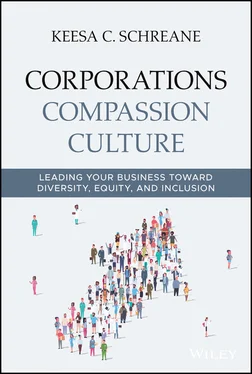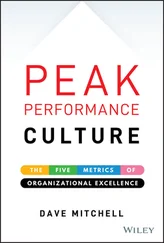Why? Leaders who choose kindness, commitment, and compassion as their leadership style see improved corporate performance and greater financial return as the result.
Yes, you read that right. Increasing compassion and empathy in C-suites is not just good for workers—it is good for the bottom line.
How can we learn from and be the leaders who choose kindness, commitment, and compassion as their leadership style and who see greater corporate performance and return—as well as greater humanity in the workplace—as the result?
This book answers that question.
Because many of us have experienced a work environment like the one I have described:
Being shut down or talked over on a conference call, repeatedly.
Seeing internal job offers that went from a sure thing to being rescinded under dubious circumstances or after the interviewer sees your complexion
Learning about the “meeting before the meeting,” where a decision was made before you entered the room, rendering the meeting to a mere formality.
It's disappointing—even outrageous—these situations still happen especially knowing the generation after us will have their own similar stories. I hope that people like me sharing our stories, will, at a minimum, let them know they're not alone.
During COVID-19, cruelty to workers reached a new extreme. Employers previously overlooked mental and emotional workplace hazards, especially “micro”-level activities that are hard to legislate and impossible to prove. Now, employers have shifted to actions that are more brazen: inflexible paid sick leave policies for workers who engage the public (largely marginalized populations), deficient work-from-home procedures, and insufficient platforms embracing employee innovation that could bring companies out of difficult business environments.
Confronted with these realities, employees are refusing to give up basic dignities and professionalism in exchange for a paycheck. Employers' ethical breaches and responses to employee well-being risks point to the need to commit to one overarching goal: employers should build cultures that nurture employees' purpose and talents and inspire them to create solutions that enrich employees, serve customers, and increase revenue. This can only be done in environments where every employee feels just as important as the shareholder. Each of us at every level of leadership—managers, directors, associates, and assistants—arrive at work with a choice: choose actions and words that affirm productivity, inclusivity, creativity, and profitability.
And if you and your company don't know how to achieve inclusion, equality, productivity, compassion, and increased revenue in the workplace, you can learn.
Let's get started!
Gratitude. This best describes what I'd like to give to the generous people who supported me in creating this book.
To my outstanding Wiley family: executive editor Sheck Cho, your kindness and enthusiasm is just what I needed for my first book. You are so gracious. Managing editor Susan Cerra, our Friday afternoon jam sessions kept me on the right path. Jean-Karl Martin, your organization and ideal sharing helped me go to market in a way that was more efficient than I could have envisioned.
I'm thankful to be part of a community of authors and publishing professionals who embraced and encouraged my ideas. Anna Murray, thank you for seeing the vision. Your faith in my ability and my ideas were instrumental in each stage of this book. I'll do my best to pay it forward.
Seth Godin and Shawn Askinosie thanks for our Zooms, chats, emails, and sharing brilliant resources.
Sheila Levine, thanks for your dedication to this project and answering all my many questions.
Stacy Grossman, thanks for jumping in so quickly. Kelly Spors, your business insights were thoughtful and engaging. Tiffany Dufu, I appreciate your inspirational kindness.
Hilary Poole, you are fun, smart, and working with you is such a joy.
Conny S. Kazungu, PhD, your energy, and consistent readiness for the next adventure I rolled out, was invaluable.
Edna Varner, EdD, I am grateful for you being my first writing coach in eighth grade—and still the best decades later!
Erika Winston, JD, MPP, your brilliant clear-headedness is priceless and exactly what I needed.
Thanks to all my interviewees: Shawn Askinosie, Doug Bristol, Marcia Chatelain, Mark Cuban, Laura Freebairn-Smith, Shennette Garrett-Scott, Seth Godin, Rebecca Henderson, Trevon Logan, Juliette Menga, Anna Murray, Daniel Pink, Caitlin Rosenthal, Susanne Smith, and Debra Walton. Also thank you to my anonymous interviewees. I'm inspired by your generosity and business acumen. Thanks for sharing your vision that there is a better way of doing business.
A special round of thanks to my Refinitiv and Thomson Reuters management team, mentors, and sponsors—Karen Ashley, Brennan Carley, Tamara Dews, Emma Miller, Deirdre Stanley, and Debra Walton—and all my wonderful colleagues who supported this endeavor.
To my phenomenal family: I'm grateful that you're supportive while demanding I act with the highest intentions—Mom, Dad, Uncle Al, Aunt Bobbie, Uncle Phearthur, Aunt Ingrid, Aunt Henrietta, Aunt Anderine, Uncle Greg, Uncle Paul, Gram, Nanny, Bimp, Dominique Banks, Daryl Alexander, Reverend Grant Harris, my “parent friends” Wanda Starke and Ron Fisher, and Tiffany K. Schreane, my sister and best friend whose brilliance, candor, humor, and love helped me bring this book to life.
To the Spirit in which I live, move, and have my being.
Keesa C. Schreaneis an environmental, social, governance, and supply chain risk business leader and host of Refinitiv Sustainability Perspectives Podcast, engaging investors and business and sustainability communities on environmental, social, and governance (ESG) data and technology, regulations, corporate risk, global financial markets, as well as diversity, equity, and inclusion (DEI).
She's also a broadcast television and livestream contributor and writer with numerous outlets and publications:
Black Enterprise
Essence
Facebook Live
Latina
NASDAQ
Refinitiv Perspectives LIVE
WDEF TV
Her expertise includes business development, sales and marketing, and employee resource group leadership, building successful strategies for operational enhancement and relationship management. She is a Certified Anti-Money Laundering Specialist (CAMS).
As founder of the You've Been Served Podcast™, she interviewed top industry leaders such as Seth Godin, Carla Harris, and Leena Nair, uncovering insights on increasing revenue, improving communities, and affecting lives through social impact, innovation, and service.
Keesa has served on numerous boards and committees aligning with her equity, inclusion, and compassion in business focus, including Business Resource and Investment Center, Girl Scout Council of Greater New York, Thomson Reuters Environmental, Social, and Governance (ESG) Ambassador, and Refinitiv Women's Business Resource Group.
Her work is recognized by the following industry groups and thought leaders:
Featured guest on Reid Hoffman's Masters of Scale alongside LinkedIn CEO, Jeff Weiner
HubSpot as “Top Female Marketing and Growth Expert”
Masonry's 18 Content Marketing Bloggers to follow on Twitter
Connect with Keesa at https://www.keesaschreane.com/.
Chapter 1 Inclusion, Equality, and Compassion in Business An Overview
Changing the course of a culture can be like changing the course of a ship. You turn the wheel slowly. The ship moves in two- or three-degree increments at a time. The degrees of movement are imperceptible, especially relative to the ship's size. Those onboard may not perceive a change from one minute to the next. But after a certain length of time they start seeing small changes in direction. Finally, those slow, steady, and careful minor turns yield a complete change in the direction of the ship. Ironically, it may feel to those onboard that the change happened all of a sudden, but in fact the ship had been turning for a long time.
Читать дальше












